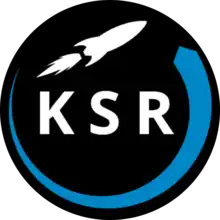 | |
| Type | Research group |
|---|---|
| Industry | Aerospace |
| Founded | January 2018 |
| Founder | Naser Ashknani |
Key people | Sulieman Alfuhaid, Fahad Al-Fahad |
| Members | 3 |
| Website | www |
The Kuwait Space Rocket (KSR), is a Kuwaiti project to build and launch the first suborbital liquid bi-propellant rocket in Arabia.[1] The project is intended to be the first step towards starting a space industry in the country and a launch service provider in the GCC region. The project is divided into two phases with two separate vehicles. An initial testing phase with KSR-1 as a test vehicle capable of reaching an altitude of 8 km (5.0 mi) and a more expansive suborbital test phase with the KSR-2 planned to fly to an altitude of 100 km (62 mi).[2] in May 16 Ambition-1 launched but had a malfunction with the parachute and crashed in free fall.
History
The project began in January 2018 for conceptual design and planning. The team started the fabrication of KSR-1 in early 2019, and as of January 2020, KSR-1 was fully built.[3]
KSR-1
KSR-1 is a vertically-launched single stage rocket. It uses a liquid bi-propellant rocket engine burning methanol as fuel and nitrous oxide as the oxidizer. KSR-1 is intended to be a test vehicle for the development of KSR-2, the goal of which is to reach space. As such, all the major components and technologies that are expected to be used in KSR-2 are present in KSR-1. The main components of KSR 1 are the engine—consisting of the injector, nozzle, and cooling jacket— with fuel and oxidizer tanks, a nitrogen gas tank, and various valves and pressure regulators.[4]

| Section | Mass (kg) |
|---|---|
| Dry mass | 12 |
| Nitrous oxide mass | 3.2 |
| Methanol mass | 0.8 |
| Total propellant mass | 4 |
| Total vehicle mass | 16 |
| Property | Value |
|---|---|
| Chamber pressure | 3100 kPa |
| Exit pressure | 94 kPa |
| Momentum thrust | 520.1 N |
| Nozzle exit velocity | 2213 m/s |
| Burn rate | 16.8 s |
| Oxidizer mass flow rate | 0.19 kg/s |
| Fuel mass flow rate | 0.047 kg/s |
KSR-1 Development Process
Engine Fabrication
The KSR-1 engine was built locally in Kuwait and it utilizes a pressure fed cycle. The engine utilizes the nitrous not only as an oxidizer but as a cooling agent, that flows around the nozzle and back into the injector again.[5]


Cold Flow Testing
The KSR team performed a cold flow testing in October 2019 to verify the engine's flow rate and plumbing.

Static Testing
KSR performed a static testing of the Injector in November 2019.

Structural Assembly
The KSR-1 was fully assembled and presented at the Kuwait Aviation Show 2020.[6]

KSR-2
KSR-2 is a planned liquid bi-propellant suborbital launch vehicle. It is the second installment of the KSR Rocket Family, composed of a single stage, fueled by nitrous oxide and methanol. KSR-2 will have a total length of 4 m, a diameter of 0.4 m and a total mass of 591 kg, its apogee will be around 100 km.
See also
References
- ↑ "Kuwaiti youth eager to put country on space exploration map". Kuwait News Agency (KUNA). 2018-09-24. Retrieved 14 February 2020.
- ↑ "ناصر أشكناني لـ"السياسة": صاروخ فضائي كويتي يضعنا في الدول المتقدمة" [Nasser Ashkanani to Al-Seyassah: A Kuwaiti space missile puts us in the developed countries]. Al Seyassah (in Arabic). Archived from the original on 2020-02-12. Retrieved 2020-02-14.
- ↑ "بالفيديو الكويت تطلق أول صاروخ فضائي محلي الصنع بعد عامين" [In the video, Kuwait launches its first homemade space rocket after two years]. Al-Anba (in Arabic). 2020-01-19. Retrieved 2020-02-14.
- ↑ "Kuwait Rocket". Kuwait Rocket. Retrieved 2020-02-14.
- ↑ Al-Hafez, Ahmed (28 December 2019). "شباب كويتيون يستعدون لإطلاق أول صاروخ فضائي" [Kuwaiti youth prepare to launch the first space rocket]. Al Qabas (in Arabic). Archived from the original on 2020-02-15. Retrieved 16 February 2020.
- ↑ "News – Kuwait Aviation Show 2020". Archived from the original on 2020-02-15. Retrieved 2020-02-15.